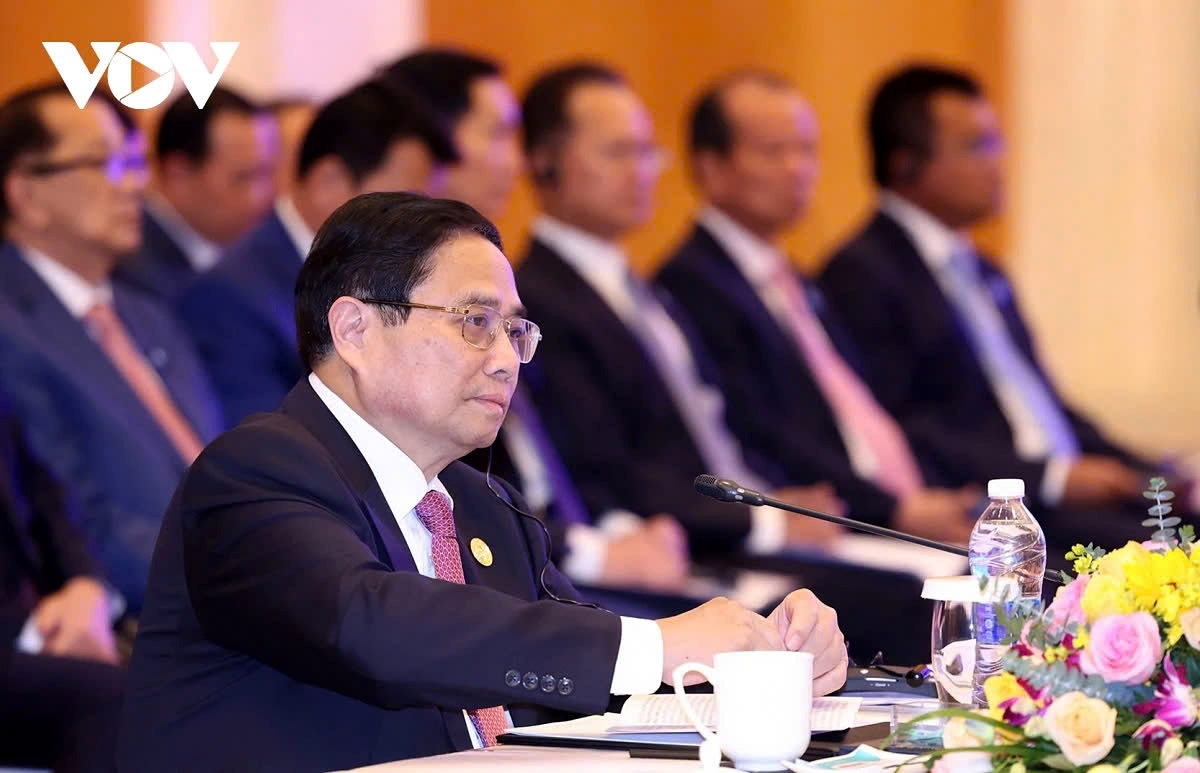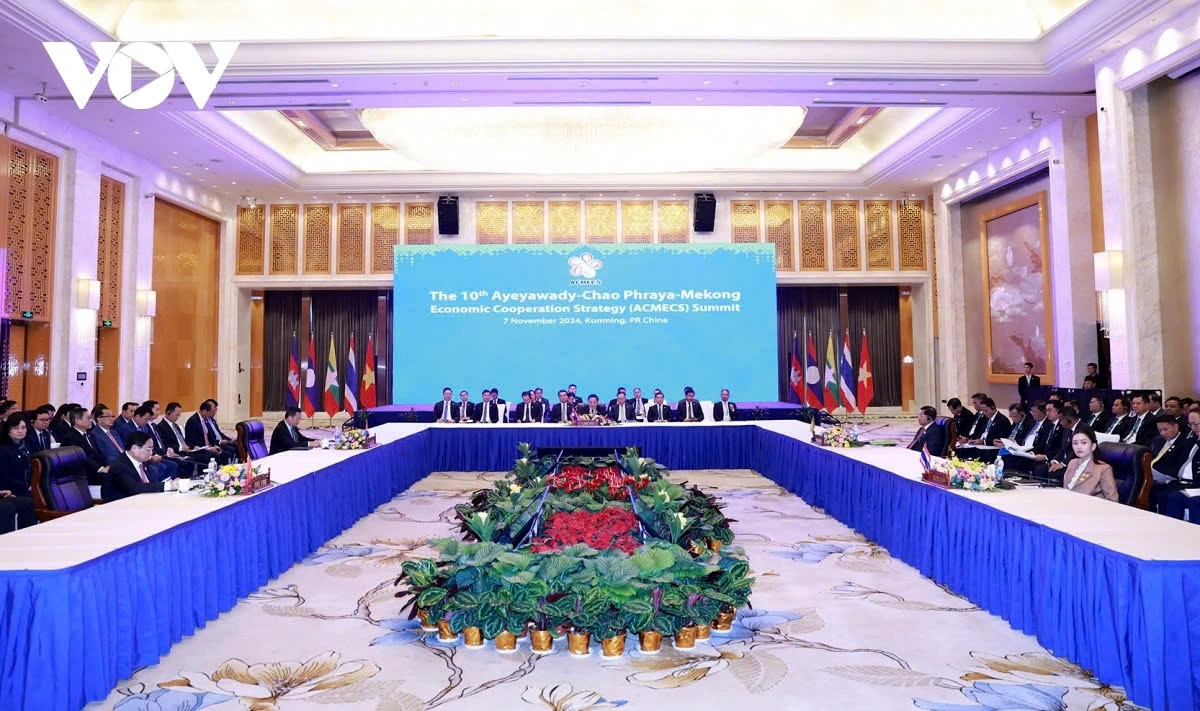
VOV.VN - Vietnamese Prime Minister Pham Minh Chinh proposed six key areas for enhanced cooperation within the Ayeyawady-Chao Phraya-Mekong Economic Cooperation Strategy (ACMECS) framework to drive regional breakthrough development, at the 10th ACMECS Summit in Kunming, China, on November 7.

Addressing the meeting that also saw the presence of leaders of four other ACMECS member countries – Cambodia, Laos, Myanmar and Thailand, Chinh emphasized ACMECS’ central role in Mekong subregional cooperation, describing it as an indispensable part of the ASEAN Community, a gateway connecting ASEAN with Northeast Asia and Southeast Asia, and a bridge between the Pacific and Indian Oceans.
Over more than 20 years of formation and development, he said ACMECS cooperation has achieved significant milestones, contributing to socio-economic development in each member country and advancing the ASEAN Community Vision.
Vietnam will continue to actively, proactively, and creatively engage in the development process of ACMECS, striving to build a strong ACMECS for a united ASEAN which is diverse in unity, and balanced in development, he affirmed.
The Vietnamese leader emphasized that the world is currently entering an era of innovation, opening up new opportunities that are crucial for the development of each country and the entire subregion. It is now time for ACMECS to define a new mission that is to build a united, strong, and sustainable Mekong community. Accordingly, future ACMECS cooperation must embody the spirit of five elements, namely shared aspirations, shared vision, shared determination, common voice, and common actions.
To this end, he proposed key areas for ACMECS to breakthrough in the next phase, including new thinking on coordinated actions; tradition-modernisation combination; rapid growth and sustainability; national-regional-international connectivity; government-people-business link; and balancing development with stability and security.
According to the PM, cooperation plans and programs should be substantial, focused, and targeted, avoiding dispersion. They must closely align with the development needs of member countries and be highly feasible, with the potential to mobilize resources effectively. He also announced that Vietnam would contribute US$10 million to the ACMECS Development Fund.
He stressed the need to ensure balanced and harmonious development between traditional economic sectors and modern technologies.
On the one hand, ACMECS should help member countries refresh traditional growth drivers and boost investment, consumption, and trade and on the other hand, it should promote new growth drivers to enable member countries to seize new opportunities and integrate more deeply into regional and global value chains, he said.

To do this, he said digital transformation should be prioritized, with a focus on investment in digital infrastructure and services, supporting startups and innovation, and applying digital technology in industries like manufacturing, information and communication technology, finance, banking, and digital customs.
It’s also important to step up rapid growth linked to sustainability, focusing on green transition, circular economy, and sharing economy. In response to the urgent need to tackle climate change and promote sustainable development in the subregion, ACMECS’s top priority is attracting green financing for green industries, clean agriculture, and low-emission transportation and logistics.
Additionally, Chinh emphasized the need to enhance cooperation among the five countries in managing and sustainably using the Mekong River’s water resources. He proposed sharing ideas on boosting cooperation between ACMECS and development partners to transfer technology and improve capacity in managing and sustainably using transboundary water resources, especially in the real-time sharing of hydrological data.
He urged ACMECS members to foster solidarity and political trust, enhance information sharing and consultations on plans and projects related to the Mekong River’s water resources, and strengthen cooperation in disaster management through capacity-building projects, establishing early warning systems among Mekong countries, and developing infrastructure that is resilient to natural disasters.
The PM stressed the importance of national, regional and international connectivity to facilitate the flow of goods, services, and people across the five ACMECS countries, by developing transportation infrastructure to connect intra- and inter-regional areas, particularly through railways and expressways. He suggested that the five countries work together to share information and coordinate the development of economic policies and plans to enhance mutual complementarity and spread benefits. He also encouraged persuading development partners to jointly invest with ACMECS to ensure seamless connectivity for a Mekong subregional integration.
He placed a special emphasis on the linkages between the government, people and businesses, and proposed that all ACMECS strategies, action plans, and projects should place the people and businesses at the center, as the main subject, target, and driving force, in the spirit of leaving no one behind. He also proposed strengthening cooperation within ACMECS to combat transnational crime, particularly drug trafficking and cybercrime, ensuring that no country allows its territory to be used to harm others.
The recommendations and proposals by the Vietnamese Prime Minister were appreciated by participating delegates, and reflected in the summit’s documents.
At the conclusion of the summit, the leaders adopted the Vientiane Declaration and witnessed the handover of the ACMECS chairmanship from Laos to Myanmar.
The Ayeyawady-Chao Phraya-Mekong Economic Cooperation Strategy (ACMECS) is a framework for cooperation between five countries in the Mekong River basin, namely Cambodia, Laos, Myanmar, Thailand, and Vietnam. The main objective of ACMECS is to promote economic cooperation both collectively and bilaterally among member countries, thereby exploiting and leveraging the comparative advantages of each country and their respective regions.
This cooperation helps enhance the competitiveness of the countries in the region, while narrowing the development gap between the member states, creating a foundation for a unified, sustainable, and prosperous Mekong subregion. ACMECS also contributes to the implementation of regional cooperation initiatives and supports member countries in achieving their national and regional development goals.
The 2024 summit is themed “Towards Seamless Connectivity for Mekong Subregional Integration.”
VOV.VN - Vietnamese Prime Minister Pham Minh Chinh underscored the need for the Greater Mekong Subregion to focus on developing new generation economic corridors, with innovation as the core, making it beyond the limits of traditional economic corridors, at the eighth GMS summit in Kunming, China, on November 7.
VOV.VN - Vietnamese Prime Minister Pham Minh Chinh joined leaders of Cambodia, Laos, Myanmar, Thailand and China, as well as the Asian Development Bank leadeship to attend the opening ceremony of the 8th Greater Mekong Subregion (GMS) Summit in Kunming, China, on November 7 morning.
VOV.VN - Prime Minister Pham Minh Chinh will attend the eighth Greater Mekong Subregion (GMS) Summit and other meetings in Kunming, China’s Yunnan province, from November 5 to 8, according to the Ministry of Foreign Affairs.
Bình luận
Bình luận của bạn sẽ được xét duyệt trước khi đăng